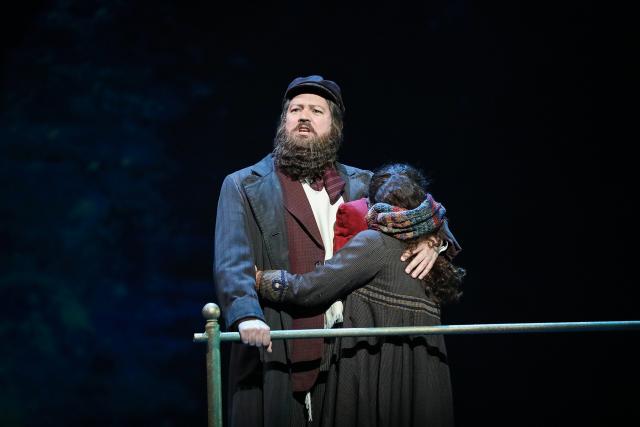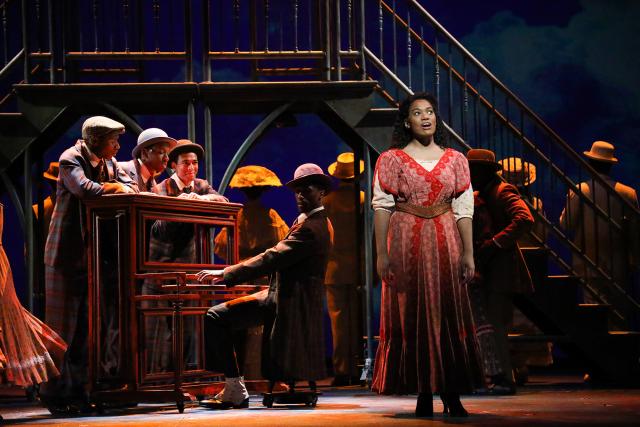

I recall back when I first became curious about the musical Ragtime that I was astonished upon locating a synopsis of the plot. It appeared, at first glance, to have such a complex structure, with its three main story lines, to be nearly impossible to stage successfully. Belying that, the extraordinary production currently being presented by Theater Under the Stars at Houston’s Hobby Center is about the best example I can imagine of genius on the stage translating the complex printed pages of a play to a living, breathing miracle right before our eyes. Based on the E.L. Doctorow novel of the same name, the musical has a book by Terrence McNally, memorable music by Stephen Flaherty, and meaningful lyrics by Lynn Ahrens. It premiered in Toronto in December of 1996, and opened its two-year run on Broadway in January of 1998. This breathtaking production is brilliantly directed and choreographed by Marcia Milgrom Dodge, with exquisite musical direction from Brad Haak who presided over the stellar 22-member orchestra. The challenging plot I mentioned earlier takes place in New York in the early 20th century and revolves about characters in three very different social arenas. There is a prosperous New Rochelle family including a feisty Little Boy (Michael Karash), a conservative and adventurous Father (Ryan Silverman), a tender and understanding Mother (Courtney Markowitz), Mother’s sometimes rebellious Younger Brother (Evan Kinnane), and the grumpy Grandfather (Kevin Cooney). The second scenario evolves a world away in Harlem where we meet the African-American ragtime piano player, Coalhouse Walker Jr. (Ezekiel Andrew), and his beautiful lover, Sarah (Danyel Fulton). The play’s surprisingly contemporary third focus falls on the immigrants arriving in New York in the persons of a struggling Jewish artist, Tateh (Robert Petkoff), and his young Little Girl (Maya Kaul). Tateh’s quest for the American dream will eventually land this peasant as a Hollywood mogul. Each of these three groups has an entourage of related characters that fill out this enormous cast approaching fifty talented actors. And we eventually go on to meet Henry Ford (Christopher deProphetis), Admiral Peary & J. P. Morgan (Paul Hope), Booker T. Washington (Stephonne Smith), and Harry Houdini (Josh Walden). Under the watchful eye of the Statue of Liberty, the magic of this production begins in the first amazing moments as the various groups arrive ascending a center-stage footbridge upon which they introduce themselves in glorious rotation and song. They are accompanied by such infectious music that we are immediately captivated as we begin to learn who all these players are during a haunting musical “Prologue” wrapped in the intoxicating choral mastery of an ensemble that quickly has the audience under its spell. Even the smoothly whirling choreography of the arriving cast (designer, Josh Walden) has a pleasantly hypnotic effect. As she bids farewell to her seafaring husband, we first hear the lovely and lilting voice of Miss Markowitz as the Mother, in a performance of “Goodbye My Love,” that could have etched fine crystal. As Father’s ship sails off on a shimmering sea beneath moonlight and stars, we experience the first of countless scenic projections from designer, Kevan Loney, that are among the finest I have seen on the stage. As Father’s departing vessel is passed by an arriving ship of immigrants, there is a stunning counterpoint trio as Mother, Father and Tateh sing the beautiful, “Journey On.” Then, propelled by Younger Brother’s obsession with a renowned actress, we are suddenly thrust into the Vaudeville world of beautiful model and chorus girl, Evelyn Nesbit (Emma Degersted), for the crimson glow and musical merriment of the fact-based “Crime of the Century.” The number is full of costume magic (designer, Santo Loquasto), as it spoofs how Nesbit’s husband, Harry Thaw (Josh Walden), shot and killed her lover, noted architect, Stanford White (Mark Jamal). But these few samples of the play’s opening scenarios cannot begin to reveal the riches that await audiences as they meet this uniformly brilliant troupe of nearly all-Equity cast members, and superb vocalists among the finest on any stage. The rich stories of the immigrants (“A Shtetl Iz Amereke”) are accented by the legendary socialist, Emma Goldman (Kim Stengel) during, “The Night Emma Goldman Spoke at Union Square.” The struggles in the Afro-American community and the emerging delights of Ragtime music are richly portrayed through the powerhouse voices and performances of Mr. Andrew and Miss Fulton. (She often reminds one of Broadway star, Audra McDonald, who originated the role of Sarah). The stunning, “Till We Reach That Day,” that closes Act One seems to unleash the human spirit with magnificent power as it addresses the nation’s racial divide with hope. Always, there is the ever-present choral support of the splendid ensemble. But amid the serious themes there are moments of unexpected fun, like the bouncing delights of the “Getting’ Ready Rag,” and the cleverly staged baseball scene at New York’s Polo Grounds. Truthfully, this show is an embarrassment of riches the likes of which I have not seen since the original Broadway production of Fiddler on the Roof. Here we have a critic’s worst nightmare: A production so vast in its scope, so wondrous in its musical and visual delights that it defies description in the single page I am permitted. But one line of dialogue stuck in my mind: “Without art, what is our existence?” We certainly have it here.
